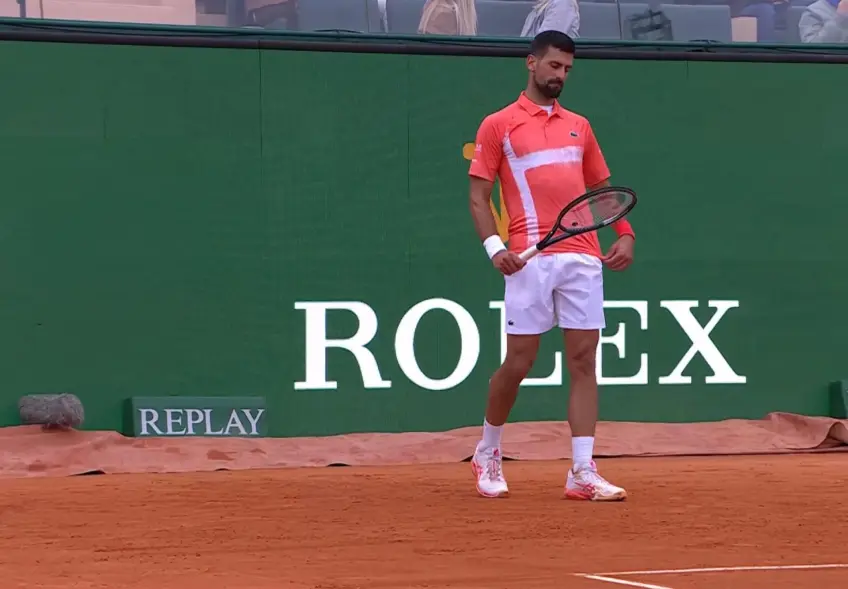
In the sun-drenched principality of Monaco, where the clay courts of the Monte-Carlo Masters gleam like a stage for tennis royalty, Novak Djokovic, the Serbian legend with 24 Grand Slam titles, delivered a performance that left fans stunned—and not in a good way. The 37-year-old, stepping onto the red dirt for his first clay match of the 2025 season, crumbled in a 6-3, 6-4 defeat to Alejandro Tabilo, a Chilean ranked No. 32 in the world. What followed was less a post-match analysis and more a public mea culpa, as Djokovic labeled his play “horrible” and issued a heartfelt apology to anyone who endured the spectacle. “Just a horrible, horrible feeling to play this way,” he lamented, his words dripping with frustration, “and I’m just sorry for all the people that had to witness this.”
The match itself was a jarring departure from the Djokovic fans have come to know—a relentless force whose return game is often hailed as the finest in tennis history. Against Tabilo, a 27-year-old with a knack for unsettling the greats, Djokovic looked out of sync from the start. His serves lacked their usual bite, and his returns, typically laser-guided missiles, landed meekly in no-man’s land, giving Tabilo ample room to dictate play. “I expected myself at least to put in a decent performance, not like this,” he admitted afterward, his voice heavy with disbelief. “This is horrible… this I didn’t expect.” For a player chasing his 100th ATP Tour title and fine-tuning for Roland Garros, the loss was a bitter pill, swallowed in front of a crowd that had hoped for vintage Djokovic magic.
Tabilo, meanwhile, emerged as the day’s unlikely hero, securing his second career win over Djokovic—both on clay, no less, following a triumph in Rome last year. The Chilean, now one of just seven players to hold a winning record against the Serb across multiple encounters, played with a composure that belied the stakes. “I was ready for him to come out and almost want to kill me,” he quipped after the match, a nod to Djokovic’s reputation for ferocity. Instead, he found gaps in the Serbian’s armor, exploiting them with precision to notch a victory that sent shockwaves through the tennis world. For Djokovic, it marked his third first-round exit in four tournaments this year, a worrying trend for a man whose dominance once seemed unshakeable.
The apology wasn’t just a courtesy—it was a raw reflection of Djokovic’s dismay. “It was actually more like the worst day,” he said, doubling down on his self-critique. He’d braced himself for a struggle, he confessed, but nothing this dire. “I was hoping it was not going to happen, but it was quite a high probability I’m going to play this way,” he added, hinting at a deeper unease about his form. The clay season, a crucible where he’s claimed two French Open titles, was supposed to be a proving ground. Instead, it’s begun with a thud, and Djokovic’s sights are now fixed singularly on Roland Garros. “Roland Garros, that’s it,” he declared when asked about his goals, a stark admission that lesser events no longer stoke the same fire in a career already brimming with accolades.
For fans, the sight of Djokovic faltering is a rare and unsettling one. This is a player who’s battled through injuries—think torn hamstrings and abdominal muscles—to hoist trophies when others would’ve folded. Yet in Monte-Carlo, the spark was absent, replaced by a listlessness that left him searching for answers. “I don’t know. I don’t have it,” he said when pressed for an explanation, a shrug in his tone. “I have it and I don’t have it. I don’t really care.” That ambivalence, from a man known for his meticulous preparation, only deepened the mystery of his current slump. Was it the transition to clay, a surface where he’s had mixed success in Monaco? Or a sign of a champion wrestling with motivation after decades at the pinnacle?
The broader context of Djokovic’s season adds weight to the moment. Losses to Botic van de Zandschulp at Indian Wells and Matteo Berrettini at the Qatar Open have punctuated a year of uncharacteristic stumbles, though a Miami Open final run offered glimmers of hope. Now, with the clay beckoning and the French Open looming, Djokovic faces a test of resilience. Monte-Carlo has never been his stronghold—last year’s semifinal run was a rare deep dive—but it’s a launchpad he can ill afford to waste. As he prepares for the Sunshine Double’s second leg in Miami, the tennis world watches, wondering if this “horrible” day is a blip or a harbinger. For now, Djokovic’s apology lingers—a poignant echo from a titan who, even in defeat, commands the stage.
Leave a Reply